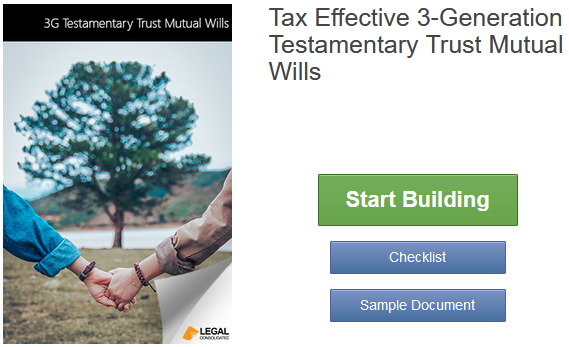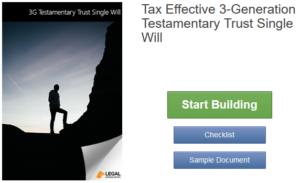Bankruptcy Trust in Wills
Put a Bankruptcy Trust in your Will to protect your spouse, children and beneficiaries.
The Bankruptcy Trust protects your beneficiaries if they go bankrupt before or after your death.
When you die you give your assets to your spouse and children.
But what if your spouse, children or grandchildren go bankrupt? The assets you gave them in your Will are lost, as well.
Put a Bankruptcy Trust in your Will to protect your assets.
Business owners protect their assets, so should you in your Will
Business owners, independent contractors and professionals (such as doctors, dentists, accountants, engineers, and lawyers) do not hold assets in their own name.
This keeps assets out of creditors’ reach. This is useful for business owners as well as the wealthy.
Lose in court? You lose your assets. But you generally do not lose the assets held in your 4 ‘safe harbours‘:
- your spouse
- ‘clean skin’ family trust
- your Self-Managed Superannuation Fund
- your dead parent’s Bankruptcy Trust in their Wills
This article considers the value of putting Bankruptcy Trusts in Wills.
A gift in a Will is lost if you are bankrupt
Under Bankruptcy law anything a bankrupt inherits during their bankruptcy goes to the the trustee in bankruptcy.
A gift in a Will is therefore lost. This is if you are lost.
The executor of the Will gives the assets gifted to you to the trustee in bankruptcy. These assets satisfy the demands of the bankrupt beneficiary’s creditors.
But what happens when your parents die and leave you a lot of money?
Your Mum and Dad have two children. Your parents are worth $5m. They leave half to you. They leave the other half to your sister.
But you are a business owner. All business owners are at high risk of bankruptcy. You want the money to go into one of your ‘safe harbours‘. A ‘safe harbour’ includes your spouse. But your parents do not see your spouse as a ‘safe harbour’ they see your spouse as a threat. (With a Divorce Protection Trust in your Will your children’s spouse cannot get the money).
By your parents putting a Bankruptcy Trust in their Wills, you and your sister are protected.
/can-abandon-gift-will-keep-pension/
Do you lose your parent’s inheritance if you go bankrupt?
Property that falls into your bankrupt hands after the start of the bankruptcy is called ‘after-acquired property’.
Money from Mum and Dad is ‘after-acquired property’.
Let us say you are bankrupt. And your parents die. Sadly, their gifts vests in your trustee in bankruptcy. The money your Mum and Dad left you in their Wills are lost. It goes to your creditors.
The moment your parents die the money belongs to the creditors. You cannot delay probate or hide the facts that your parents are dead and left you money. See Re Pevsner [1983] FCA 119.
If you do not disclose this inheritance immediately upon your parent’s death you risk a fine, imprisonment and your bankruptcy period extending to eight years.
Bankruptcy Trust in the Will
At Legal Consolidated all our 3-Generation Testamentary Trust Wills have a Bankruptcy Trust in them.
Therefore, when your parents die none of their money is lost to your creditors.
A 3-Generation Testamentary Trust also has other types of trusts. These include:
- divorce protection trust
- superannuation testamentary trust – to reduce the 32% tax payable on super
- Minors, Maintenance Trusts and Vulnerable children trusts in Wills
- special disability trust
How does the Bankruptcy Trust in the Will work?
The Bankruptcy Trust in your Will gives the Executors the power to decide how assets and income are managed and distributed to you and your family. The Bankruptcy Trust allows the trustee to be flexible to address each beneficiary’s individual circumstances. Assets are protected from external creditors and the bankruptcy trustee as the property is owned by the trustee and not the beneficiary.
Are Accountants and Financial Planners able to build Wills on Legal Consolidated’s website?
Yes, you can.
/bankrupt-widow-keeps-dead-husbands-superannuation/
After-acquired property in Wills – section 58 Bankruptcy Act 1966
Assets that come into the bankrupt’s hands after he is bankrupt are ‘after-acquired property’.
“After-acquired property” rules for Wills are in section 58 Bankruptcy Act 1966.
Any assets that a bankrupt gets during bankruptcy vests in the bankruptcy trustee. Such assets are lost to the creditors.
Any assets a bankrupt can get his hands on is then then under the control of the bankrupt trustee.
Example of after-acquired property from dead parent’s Wills:
Frank the son is bankrupt.
From the shock of their son going bankrupt mum and dad die. In their Wills they leave everything to their son Frank. Because Frank can get his hands on the money, the trustee-in-bankruptcy gets the money.
The trustee-in-bankruptcy ‘stands in the shoes’ of the bankrupt. If the bankrupt can get access or control of the wealth then the trustee-in-bankruptcy takes the money.
In contrast if Frank, after mum and dad die, cannot get his hands on the money, then the trustee-in-bankruptcy cannot get its hands on the money.
It is only if the bankrupt is entitled to assets during bankruptcy, then such assets vest in the bankruptcy trustee.
Re Pevsner; Trustee in Bankruptcy [1983] FCA 119
In this case the Trustee-in-Bankruptcy for the bankrupt Michael Reginald Pevsner gets all interest in his dead mother’s estate.
Mr Pevsner was bankrupt when his mum died. But he was out of bankruptcy before the estate is administered. However, that was not good enough to bankruptcy the Bankruptcy Act. The Court stated:
“The directly relevant sections of the Bankruptcy Act 1966 are ss. 58 and 116. Section 58 provides for the vesting of property already vested in the bankrupt at the time of his bankruptcy and of after-acquired property in his trustee. Paragraph 58(1)(b) provides:
’58(1) Subject to this Act, where a debtor becomes a bankrupt –
. . . . . .
(b) after-acquired property of the bankrupt vests, as soon as it is acquired by, or devolves on, the bankrupt, in the Official Trustee or, if a registered trustee is the trustee of the estate of the bankrupt, in that registered trustee.’
Section 116 of the Act, so far as it is relevant, provides:
“section 116(1) Subject to this Act –
(a) all property that belonged to, or was vested in, a bankrupt at the commencement of the bankruptcy, or has been acquired or is acquired by him, or has devolved or devolves on him, after the commencement of the bankruptcy and before his discharge; and
(b) the capacity to exercise, and to take proceedings for exercising, all such powers in, over or in respect of property as might have been exercised by the bankrupt for his own benefit at the commencement of the bankruptcy or at any time after the commencement of the bankruptcy and before his discharge,
is property divisible amongst the creditors of the bankrupt.”
The expressions “property” and “the property of the bankrupt” are defined in s.5 of the Act which commences with the usual words, “In this Act, unless the contrary intention appears -“. “Property” means real or personal property of every description, whether situate in Australia or elsewhere, and includes any estate, interest or profit, whether present or future, vested or contingent, arising out of or incident to any such real or personal property. “Property of the bankrupt” means the property divisible amongst the creditors of the bankrupt and includes any rights and powers in relation to that property that would have been exercisable by the bankrupt if he had not become a bankrupt.
Section 153 of the Act provides for the effect of an order of discharge. The discharge operates to release a bankrupt from all debts provable in the bankruptcy. The section does not affect any rights to the bankrupt’s property which passed to the trustee by reason of the provisions of ss.58 and 116. And by s.152 a discharged bankrupt, notwithstanding his discharge, is obliged to give such assistance as the trustee reasonably requires in the realisation and distribution of such of his property as is vested in the trustee.
The authorities plainly establish that at the date of the bankrupt’s discharge from bankruptcy he had no interest in the property left by his mother. The administration of her estate was not complete. He did, however, have a chose in action against the administrator for the due administration of her estate. That, of course, is subject to such operation as should be accorded ss.58 and 116 in the circumstances of this case.
The authorities to which I refer are Lord Sudeley v. Attorney-General (1897) A.C. 11 and Commissioner of Stamp Duties (Queensland) v. Livingston (1965) A.C. 694. In the latter case Viscount Radcliffe who delivered the judgment of the Privy Council said of the beneficiary in that case that she was not entitled to any beneficial interest in any property in Queensland at the date of her death. He continued (p.717):
“What she was entitled of in respect of her rights under her deceased husband’s will was a chose in action, capable of being invoked for any purpose connected with the proper administration of his estate”.
There are similar cases such as Official Receiver in Bankruptcy v Schultz [1990] HCA 45
/bankrupt-widow-keeps-dead-husbands-superannuation/
Does the Bankruptcy Trust protect grandchildren and others?
The Bankruptcy Trust in your Legal Consolidated Will works for 80 years from your parent’s death. (Forever, in South Australia, as they do not suffer the Law of Perpetuity.) It works not only for you at the moment of your parent’s death. It works if you go bankrupt many years after your parent’s death. And after you die, if your spouse or children suffer bankruptcy they are also protected.
The 80 year period is extended forever in South Australia. South Australia does not have the restricted ‘Law of Perpetuity’.
A Legal Consolidated 3-Generation Testamentary Trust Will provides the best opportunity to protect an inheritance. This is from being exposed to creditors in bankruptcy.
All Legal Consolidated 3-Generation Testamentary Trust Wills contain Bankruptcy Trusts.
Rather than your inheritance passing directly to you as a beneficiary, your share of the estate instead passes into a Bankruptcy Trust.
If you as a bankrupt beneficiary inherit assets directly, they pass to the Trustee in Bankruptcy. However, assets that do not pass to you directly, but instead are held in a Bankruptcy Trusts for your benefit are not property for bankruptcy purposes. They are less likely to be lost to the Trustee in Bankruptcy or creditors.
A ‘right to occupy’ is not as good as a Bankruptcy Trust
Another structure that may be utilised for asset protection is a right to occupy. This relates specifically to any property (usually a principal place of residence) which may form part of the estate.
However, Legal Consolidated does not like a ‘right to occupy’. Nor do we like ‘life estates‘.
What normally happens if a beneficiary is bankrupt?
Whether there is a Bankruptcy Trust in a Will or not, the Executor can search to see if one of the beneficiaries is bankrupt. You pay for that service here National Personal Insolvency Index.
If the beneficiary is bankrupt:
- With no superannuation testamentary trust the executor, sadly, sends the estate assets to the Trustee-in-Bankruptcy
- But, with a Superannuation Testamentary Trust the executor is able to retain the wealth in the Will
As we see above, 58(1)(b) Bankruptcy Act 1966 (Cth) states that ‘after acquired property of the bankrupt vests, as soon as it is acquired by or devolves on the bankrupt in the trustee in bankruptcy.’
Without a Bankruptcy Trust in the dead person’s Will, when your parents die, if you are bankrupt, the assets are immediately lost. Similarly, you must notify Centrelink immediately when your are on Centrelink and someone dies.
“Oh, I thought I could delay getting Probate and not tell the Trustee-in-Bankruptcy, the family court or Centrelink.”
That is not correct.
As a beneficiary of an estate you have a chose in action. This is before the assets of the estate actually reach your hands. At death, as a beneficiary have an enforceable right:
- for the proper administration of the estate by the executor
- an expectation that the dead person’s assets pass to you after liabilities and costs are paid.
In the case of a bankrupt beneficiary, this ‘chose in action’ or ‘right’ passes to the trustee in bankruptcy. And you must notify Centrelink or the divorce courts, if you are in those situations.
But this is not the case if the dead person put a Bankruptcy Trust in the Will (or a Divorce Protection Trust). In that instance you lose those rights.
/loan-to-parent/
Can I delay administering the estate to avoid the Trustee-in-Bankruptcy, family court and Centrelink?
The executors are usually the beneficiaries or family members. They may feel justified in ‘bending the rules’.
The executor may decide to play possum. And delay administering the estate. Or hold the money in the deceased estate trust account until the beneficiary is out of the family court or bankruptcy.
Defrauding creditors or the family court is against the law. The ‘delaying’ executor may even be subject to criminal charges.
Can an executor turn a blind eye about the bankruptcy?
Unless you have a Bankruptcy Trust in the dead person’s Will, an executor, upon finding out a beneficiary is a bankrupt, must contact the trustee-in-bankruptcy. And tell the trustee-in-bankruptcy their ‘good news’.
If you fail to do that then the executor is personally liable for the oversight. Ignorance is not an excuse.




